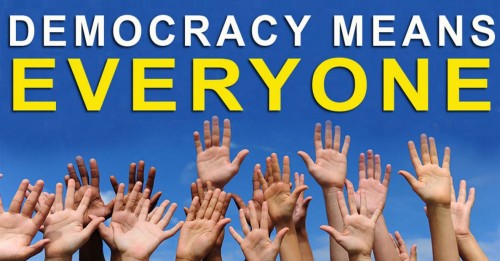A dirty deal to drown out our inner voice

Don’t let the noise of others’ opinions drown out your own inner voice.” Steve Jobs, 2005
Voices, opinions and narrative shape a society in a free democracy. This is a crucial underlying construct of our ‘Australian Culture.’ It is one of the essential freedoms we enjoy as a country. Our voices, my voice, your voice shapes us.
The right to use our voice to protest. The right to use our voice to use social media and other platforms to speak up loudly for or against issues. The right for journalists to report on sensitive issues and to criticise the Government. The right to nominate as a voice in our parliament and the right to vote for that voice.
Sometimes debate in our country is a lovely, manicured clear pathway and sometimes our debate is a thick forest with bruising scrub, dry arid land, harsh conditions, thorns that cut and grab and where we have to step around snakes with fear and angst.
However, it is our inner voice which allows us to block out the loud opinions of others and look up above that noise to the wisest of owls who will guide us out, beyond the snakes and to the other side to a place of peace and tranquility.
Every single person’s landscape of peace and tranquility is not the same. Some will find that peace in a conservative landscape, an authoritarian landscape, a socialist landscape, a (small l) liberal landscape or a libertarian landscape. For some people, depending on the issue at hand, they might find they have unfolded their deckchair and soaked up the sun in different landscapes over time. For example, some may sit in the socialist landscape for worker’s rights, but will also sit in the punitive and conservative landscape to advocate for the death penalty.
There are also some people who don’t fight through harsh scrub and snakes, they have no wise owl to guide them to their landscape, they are trapped forever in a 70’s disco doing ‘The Shrug’ to the tune of ‘meh, meh, meh, meh, meh.’ Sometimes they might reach out and take a few steps down the easy manicured path of debate, but you will never get them near the forest.
Sadly, today, there are still many loud voices which drown out the opinions of those in minority groups who are suffering from harm. More and more people look to the wise-owl of their inner voice, to guide them and set themselves down in the landscape of the minorities in solidarity and that is a good thing, because it is so important that these voices are the loud and heard.
I do not support the argument that the only voices we should have in our parliament are the Independent voices and that the parliament would be better without the major parties.
I do not believe a parliament of independents is the panacea to some of the issues we have in parliament today. There are only so many frames of political ideology and to have the necessary legitimate and at times coercive power, blocs would be formed, representing that ideology.
The theories which explain power in relationships and politics are complex. Power can see people struggle over finite resources, some have the ability to use referent power, some can use power to make other’s dependent upon them and some can use coercive power. A party of Independent MPs or Senators is not the nice walk down the manicured path, some believe it to be.
What I strongly advocate for, is that all citizens should have the freedom to vote for a party who has either a solid platform they agree with, or a vote for an independent voice, which may take a myriad of conflicting positions.
My strongest argument is for informed voting. Although I am not a supporter of the Liberal party, I would prefer to see a voter vote conservative/LNP who has a truly informed conservative position they align with. They are informed and fully understand the damage that this party’s ideology and policies will do to certain groups of people, how their authoritarian nature will aim to suppress our voices and that they favour punitive measures above all else. I support that this voter is comfortable with being a bastard and owns it and wears it on their sleeve with pride.
I would rather this than just voting because of the aesthetical appeal of an individual politician, or they find a slogan catchy, without knowing what that party or person is really about. I want to turn the music off at the “Meh, meh, meh” disco and fill the disco full of owls to be followed right out of there.
I argue strongly for this, because this is critical in shaping who we really are. The voices who end up on the other side of power (whomever that may be), end up battling through the forest and/or sitting in solidarity with groups of minorities. They know their collective needs to grow stronger and their voices need to be more persuasive and louder. This enables robust debate and shapes our country. This is important as we do not want to just stretch out on a deckchair and catch a few rays in our ideal landscapes, but to build a house on it for life.
In the debate of democratic voting, the majority of people have built their house on the landscape of democracy. The Greens, the Xenophon party and The Liberals want to knock down our democratic houses. They have done a dirty deal to silence the voices of the independents in the Senate. They are essentially forming a bloc on this issue to use legitimate power to drown out the inner voices who sit in their landscape and in solidarity with the Independents.
The Greens, the Xenophon party and the Liberals want to knock down your house of democracy by relying on the voters who are bopping away to “The Shrug” to the tune of “meh, meh, meh, meh.” This is the key to their success and the key to suppressing the independent voice.
Bill Shorten’s Labor is sitting in solidarity in the Independent’s landscape of democracy.
As a member of the Labor party, I am glad that this is where my party sits, as it is where I would be sitting regardless.
I will end this article, not with my own conclusion of why this is so wrong, but I will leave you with a must watch video of Anthony Albanese speaking out against the changes to the Senate Voting system. I hope that the voice in this video, encourages you speak up against these voting reforms with your pen on election day.
[youtube https://www.youtube.com/watch?v=oRnHSZsiKfc&w=560&h=315]
Originally posted on Polyfeministix










